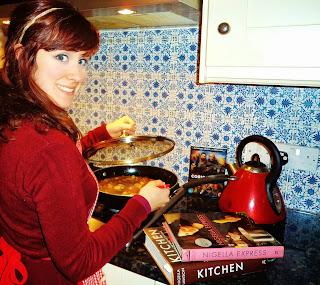Team Nigella
We were expecting the Nigellissima Christmas special to be a
dose of camp, glamorous cookery, with lashings of flavour and fun. Following
recent revelations about the alleged conditions of her marriage to Charles
Saatchi, and his public attack on her in a restaurant, Nigellissima did not
seem half so much fun. Suddenly, we saw sadness behind her eyes, as she
delivered her seductive glances to camera, and perceived a fractional falter in
those smiles. Of course, the programme was probably filmed at exactly the same
time as the rest of the series (aired before Nigella’s problems hit the news),
and the perceived poignancy of Nigella’s looks, were probably purely imaginary.
Like a Shakespearean text, Nigella’s performance is open to interpretation, and
to the projection of an audience’s agenda.
Just as an audience about to enjoy Henry V is asked to imagine the ‘vasty fields of France’ in a
theatre, when we watch Nigella, we are invited to imagine that a fairy-light-festooned
warehouse is her family kitchen, and that the handful of BBC-types enjoying canapés
and cocktails are her friends, and we are happy to suspend our disbelief. In the
same way as the peripeteia of lords and princes fascinate us in Shakespeare’s
tragedies, so the reversal in fortunes of the figures elevated by our society
seem to hold, for many, an irresistible lure.
In Shakespeare’s Coriolanus
Martius earns celebrity and popularity through his military victories. In Act II
Scene I, Brutus describes, with derision, the common people flocking to see
Martius and unable to talk of anything else.
All tongues speak of him, and the bleared sights
Are spectacled to see him: your prattling nurse
Into a rapture lets her baby cry
While she chats him: the kitchen malkin pins
Her richest lockram 'bout her reechy neck,
Clambering the walls to eye him: stalls, bulks, windows,
Are smother'd up, leads fill'd, and ridges horsed
With variable complexions, all agreeing
In earnestness to see him:
There is something gross and claustrophobic in the sweaty
neck of the nurse as she clamours to see him, and all the orifices of each
building ‘smother’d up’ with voyeurs. It isn’t a stretch to see a pack of
paparazzi in a similar light, or the faces pouring over gossip magazines as
parallel to those at the windows in Coriolanus.
Martius’ popularity in this play is short-lived, and he is soon torn down by
the same people who worshipped him. With a little stirring from Brutus and
Sicinius, the people turn against him and expel him from the city. In many
ways, the consumers of British media seem to be equally fickle, and our
opinions change like our notorious weather (and like the weather, often erring
on the side of drizzle).
In the aftermath of her separation from Saatchi, a great
fire of speculation has blown up around Nigella, kindled by a media frenzy, but
I hope that it will not darken her forever. Unlike Shakespeare’s Martius
Coriolanus, Nigella is gifted with eloquence, humility, and a theatrical
self-awareness. Martius’ inability to perform anything other than his own
reality leads to his downfall and ruin, but Nigella can certainly perform, and
just as we can ignore the fact that her kitchen is a warehouse, her charm means
that we can probably ignore a great deal more.
#teamnigella
 |
| Anger is not my meat! |


Comments
Post a Comment